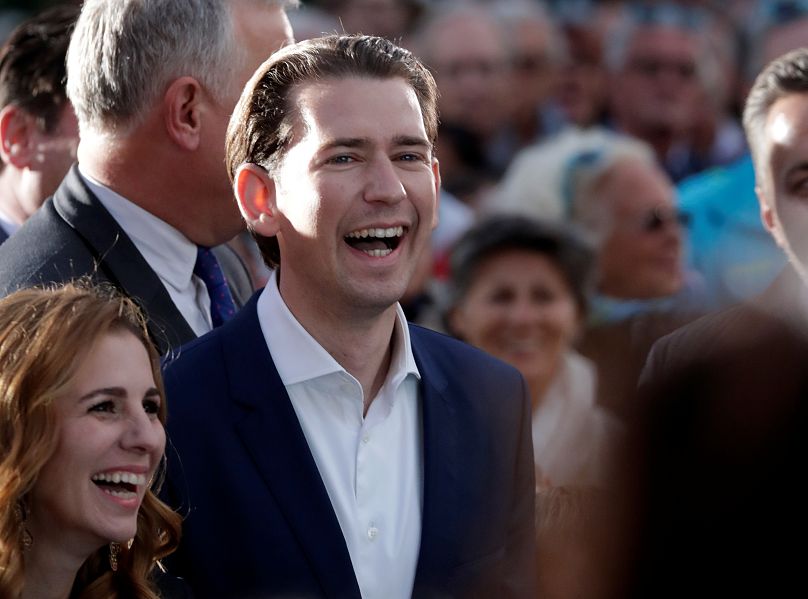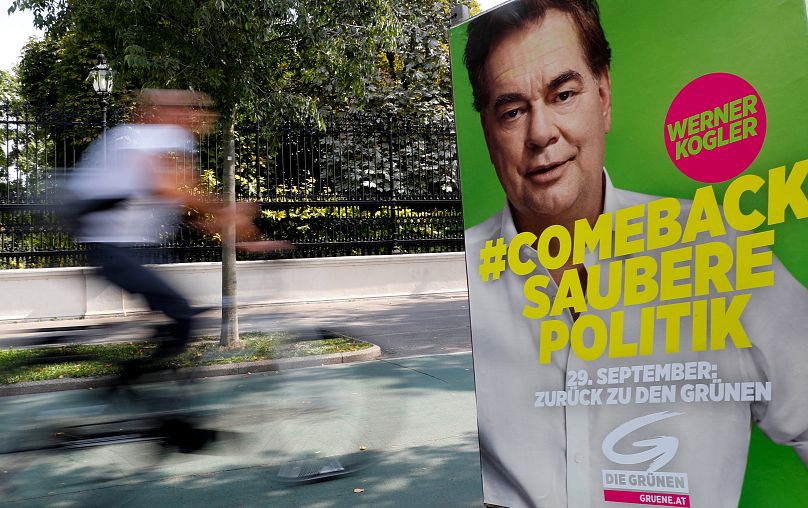Former conservative chancellor Sebastian Kurz is cruising to victory but it is not clear which coalition partners he will pick — the far-right party FPO or a so-called 'Jamaica' alliance with the Greens and Liberals?
Austrians will head to the polls this Sunday for parliamentary elections, just four months after a video scandal blew up the conservative/far-right coalition formed in 2017.
 ADVERTISEMENT
ADVERTISEMENT
 ADVERTISEMENT
ADVERTISEMENT
According to opinion polls, former conservative chancellor Sebastian Kurz is cruising to victory but he will still need coalition partners to secure a majority.
It is not clear whether Kurz will choose to go back to his old political ally, the far-right FPO, or look left for new alliances.
Former far-right leader and Vice-Chancellor Heinz-Christian Strache was forced to quit in May over a video, which appeared to show him in Ibiza offering to fix state contracts and explain how to dodge party financing laws to a woman posing as a Russian oligarch's niece.
The coalition government collapsed soon afterwards and a general election was called.
Can the far-right get back to business despite the fallout of the Ibiza scandal?
Euronews looks at the stakes in the Austrian elections, a country that has been at the forefront of the nationalist wave in EU.
Kurz set to cruise to victory
Kurz's People's Party (OVP) currently has a commanding lead in opinion polls, with around 34% of potential votes.
The former chancellor, 33, emerged largely unscathed from the Ibiza scandal.
“He managed to present himself as a victim of this scandal and people don’t perceive him as being involved,” said expert Paul Schmidt, Secretary-General of the Austrian Society for European Politics, told Euronews.
"Disappointed FPO voters are primarily swinging to the OVP," political analyst Peter Filzmaier said, explaining that the FPO's six-point drop since the last election has benefited Kurz's party. "If I have voted for the right-wing FPO and I am outraged by Ibiza, where else should I go?"
With his followers, Kurz retains a “very strong and positive image,” Schmidt said. Many people agreed with what Kurz’s government was doing and want to see a continuation of his policies, the expert continued.
“The structure of the People’s Party in Austria offers a very strong base to lead a successful election campaign,” Schmidt added, citing its anchoring at the regional level and its financing power.
If the polls are right, Kurz will have “all the cards in his hands” to choose between coalition partners across the political spectrum, Schmidt added.
Coalition with FPO 'most likely outcome'
According to the expert, a continuation of the old coalition with FPO remains the most likely outcome of the election.
With support for the far-right party around 20%, this alliance would grant a majority to a Kurz-led government.
“I think the easiest thing for Kurz is to continue this coalition,” Schmidt said.
Both parties share strong common ground, including a hard-line on immigration.
The FPO is so keen to govern with Kurz again that a campaign video shows its new leader Norbert Hofer in couples' therapy with Kurz, saying in unison: "We have many ideas in common."
The fact that the FPO is weaker now than it was in 2017 could be beneficial to Kurz, Schmidt said. This means its competencies within the coalition government could be limited, leaving the Conservatives with more leeway.
Yet the FPO option, dubbed the "Ibiza coalition" by Kurz's critics, is not without risks.
Earlier this week the party was hit by fresh allegations that former party leader Heinz-Christian Strache misused expenses.
“When it comes to stability, there are risks because the FPO is in danger of splitting up,” Schmidt said.
If this scenario comes to fruition, Austria could have another election "sooner than we think,” he added.
'Jamaican' coalition still possible
A so-called 'Jamaican coalition' involving the Conservatives, the Greens and the Liberals, could offer Kurz an alternative.
The Greens are currently polling at around 13%, buoyed by the fact the environment has shot to the top of Austrians' concerns.
“We already saw with the European elections that migration was pushed to the back and the climate issue was the number one,” Schmidt said. This could be another argument for Kurz to ally with the Greens rather than FPO.
The liberal party Neos is polling around 8% and would likely be brought in under this scenario to secure a stable majority.
The Jamaican coalition, which would be a first in the country, would fit with Kurz's self-branding as a moderniser, despite his conservative agenda.
“It would completely change his image,” Schmidt said.
Yet the three-way coalition would also make life more difficult for Kurz.
There could be confrontations with the Greens over climate protection and it would be difficult to strike compromises, according to Schmidt.
While the Liberals share Kurz's pro-business agenda, they are very much into transparency and support pro-European policies — areas where they will likely clash with the Conservatives.
'Grand coalition' with Social-Democrats unlikely
Allying with the Social-Democrats (SPO), the party with which the Conservatives shared power for decades, is mathematically possible but unlikely.
“I don’t see much ground that they would have in common, also keeping in mind that he [Kurz] always blamed the Grand coalition in Austria for blocking reforms,” Schmidt told Euronews.
“It would be a difficult task, not impossible but difficult,” he added.
"He basically has the choice between the plague, cholera and maybe also Ebola," political analyst Thomas Hofer said of Kurz's coalition options.
European implications
When it was formed in 2017, the coalition government, led by Kurz and Strache, was the only one in western Europe to include the far right.
The country has been at the forefront of the nationalist wave that has since swept Europe, with recent examples including the (now defunct) populist coalition with the far-right League in Italy or the rise of anti-immigration Sweden Democrats (SD).
Austrian elections will, therefore, be closely watched in Brussels and other European capitals.
“For Austria to become a more proactive European player, it would probably be interesting to have a Jamaican-style coalition or even a Grand Coalition with the Social-Democrats,” Schmidt said.
A coalition with the FPO may want to see a change in EU treaties, push for the principle of subsidiarity and see which competencies could be renationalised, he added.
“In a Conservative/FPO coalition, European affairs would be driven by the national agenda,” Schmidt said.
“But keep in mind that all the European competencies were already placed with the Conservatives [in previous governments]. And now, with the Conservatives gaining ground and the FPO losing votes, we will probably see this trend grow stronger,” the expert added.
Undecided voters
While analysts feel quite safe to say that Kurz's Conservative party will score high, one-third of voters are still undecided, Schmidt said.
“We know who will be the big winner, that’s for sure, but for the other parties, there is still some sense of uncertainty.”












